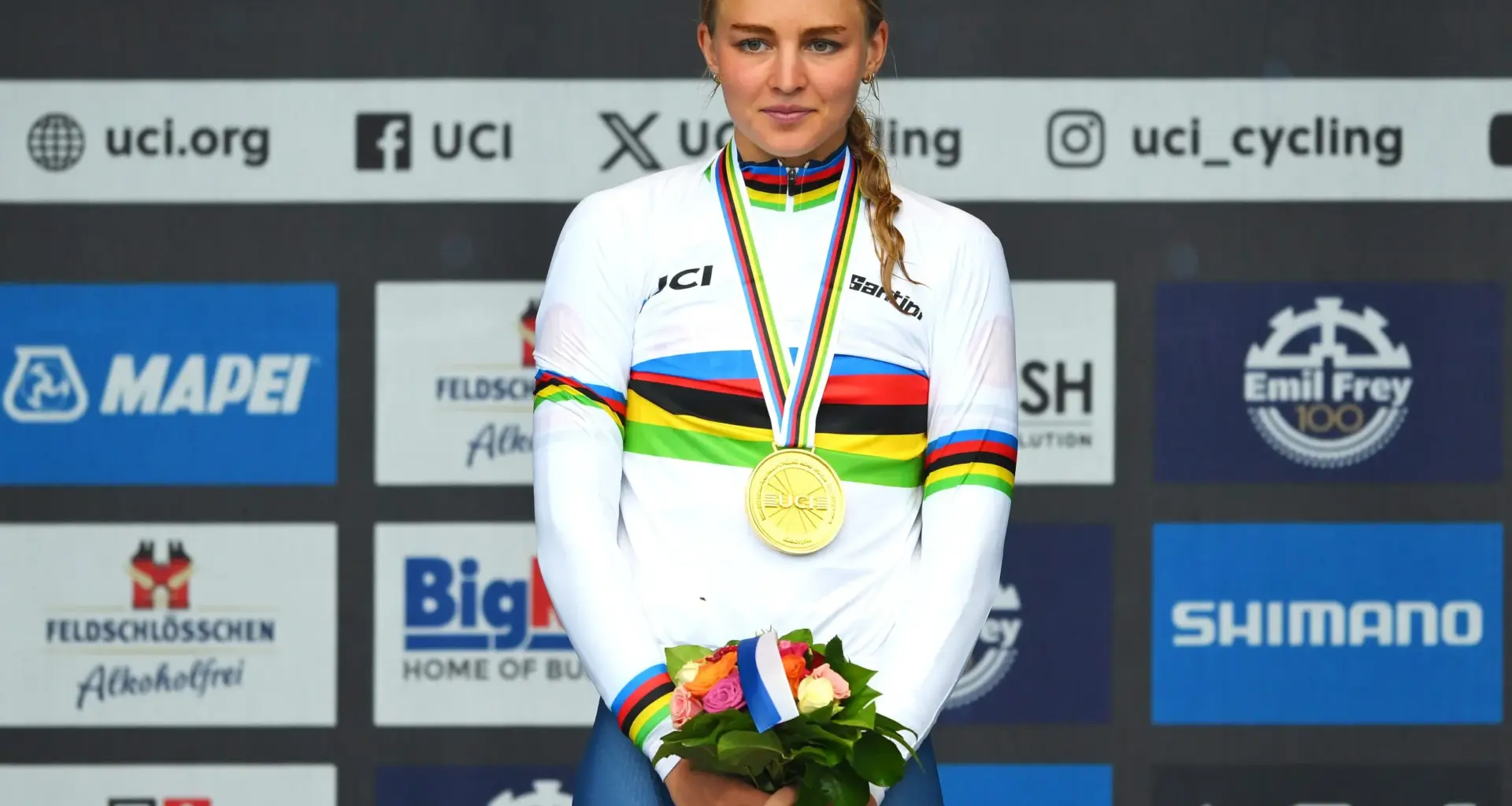At the first UCI Road World Championships on African soil, Tadej Pogačar and Magdeleine Vallières claimed the headline elite road races, securing their place in the history books and guaranteeing 12 months in the most coveted outfit in pro cycling.
While the Rwandan Worlds have just slipped into the rear-view mirror, let’s cut the afterglow of Pogačar and Vallières’ rainbow glory short and reach for our crystal ball.
We’ll look ahead to the next six editions of the UCI Road World Championships, taking us from Montréal 2026 to Trentino 2031. For each year, we’ll predict the winners in both the elite men’s and women’s categories. We’ll gloss over the junior and under-23 ranks. The hopefuls for that are probably still wearing nappies.
Related questions you can explore with Ask Cyclist, our AI search engine. If you would like to ask your own question you just need to , or subscribe.
If you would like to ask your own question you just need to , or subscribe.
Montréal 2026
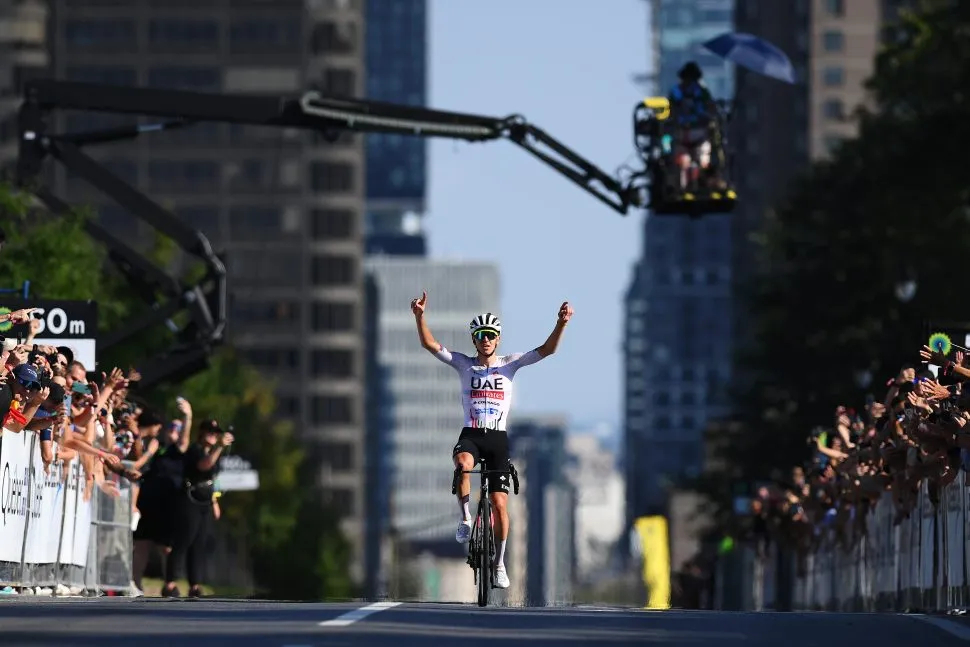 Alex Broadway/Getty Images
Alex Broadway/Getty Images
Next year, we pack our bags and head to Montréal. The city is no stranger to pro cycling, having hosted the GP Montréal for some decades now. Following the philosophy of ‘if it ain’t broke, don’t fix it’, the World Championships route will follow almost an identical city circuit around Mont-Royal, including the centrepiece Côte Camilien-Houde (1.7km at 7%). This’ll make the Canadian Worlds an open door for the puncheurs.
Unlike the men, there’s no GP Montréal for the women, so we’ll be going in blind. That said, the women’s race will be 180km long, clocking up 2,502m of elevation gain – a middle ground between the 2024 and 2025 parcours. While the reigning champion Vallières is Québécoise, I think the peloton will have learnt their lesson from 2025 and won’t let a strong escape group cloud the chances of the favourites – although we’ve said that before.
Now switched on, expect a showdown between Elisa Longo Borghini, Demi Vollering, Kim Le Court-Pienaar, Marlen Reusser and Pauline Ferrand-Prévot. The Dutch team have historically been dysfunctional in recent editions, but I see a situation that plays into the hands of the Oranje. Puck Pieterse and Vollering will be a lethal duo on a course like this, flanked by Amstel Gold champion Mischa Bredewold. On the other hand, the fast kick of Le Court-Pienaar shouldn’t be underestimated, even if she has weak team support to lean on. It’s hard to call the winner – unlike the men’s race – but Le Court-Pienaar is my pick if she manages to translate her stellar 2025 form into the new year.
For the elite men, the Quebec Worlds offer a far more palatable 3,720m in elevation gain – almost 2,000m less than the Rwandan course this year and a fair few hundred lower than Zurich 2024. Even though the course is tamer than the two previous editions, prepare for another Pogačar showcase. He’s won GP Montréal on two occasions, and he even gifted the victory this year to his North American teammate Brandon McNulty.
Cyclist’s prediction: Kim Le Court-Pienaar and Tadej Pogačar
Haute-Savoie 2027
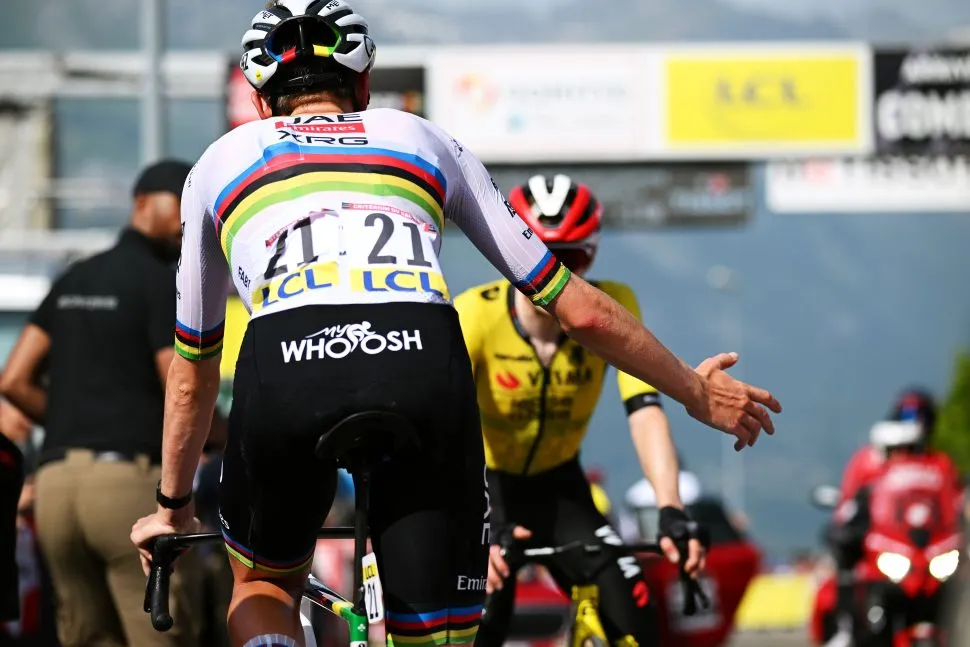 Dario Belingheri/Getty Images
Dario Belingheri/Getty Images
If you thought the Rwandan course was hard, France has decided to raise that bar. This was to be expected, since the Worlds will be centred in the French Alps.
As part of the next Super Worlds, the parcours for the 2027 World Championships has been released way ahead of time. The race will end in Sallanches, mirroring the iconic 1980 World Championships event, which saw Bernard Hinault decimate his rivals. The halo climb, the Côte de Domancy (2.5km at 9.4%), has been well-drilled in recent years, having featured on stages of the Tour de France and Critérium du Dauphiné over the past couple of years. The Tour is also expected to trial the course during the final week of racing at next year’s race. In looped form, the elite men’s course is expected to clock up close to 5,700m of elevation gain.
Let’s address the obvious. This biblical course begs another chance for Pogačar to claim the rainbow jersey. Yes, Jonas Vingegaard could be wheeled out in Danish colours to spoil the party. Realistically though, this course looks nothing but favourable towards UAE Team Emirates XRG’s Tour de France machine. Surely we’d know the words to the Slovenian national anthem by heart at this point.
If he seals the win, along with the Montréal edition in 2026, Pogačar would become the first rider in history to win four road race titles on the trot. Now this should truly solidify his place as the greatest of all-time, right?
It seems as though the difficulty of the race should benefit the world’s top climbers. In the women’s peloton, that’s been proven to be Vollering in recent years. That’s if Ferrand-Prévot slows down as she reaches her mid-30s by the time her home Championships roll by. Vollering, on the other hand, will be 30 and supported by another monstrously strong Dutch squad, so it seems like her race to lose.
Cyclist’s prediction: Demi Vollering and Tadej Pogačar
Abu Dhabi 2028
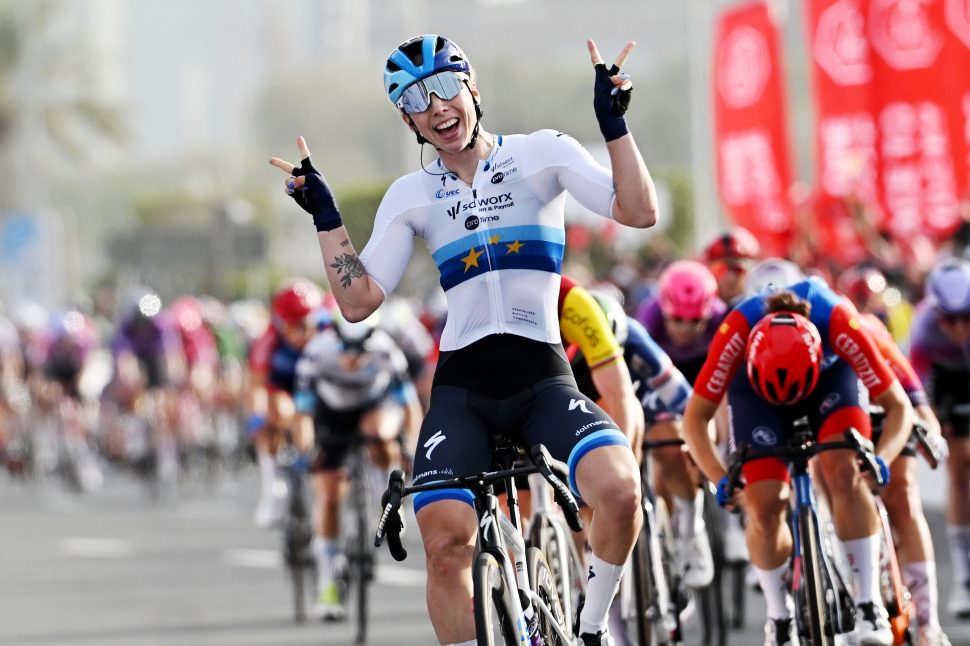 Tim de Waele/Getty Images
Tim de Waele/Getty Images
From the Alps’s traditional hairpins, we move to the sandy roads of the UAE. Some have speculated a Jebel Hafeet cameo, but the UAE Tour staple is 180km away from central Abu Dhabi, which will presumably host the race finale. In that case, it’s almost a certainty that the 2028 Worlds will be one for the sprinters. It’s a long time coming – there hasn’t been a sprinters’ Worlds course since 2016.
There are a hell of a lot more variables to factor into a sprint finale. It could be windy, there might be crashes, untimely punctures or a whoopsie in the leadout. However, there’s one woman who will probably start as the red-hot favourite. Indeed, Lorena Wiebes bagged heaps of stages at the UAE Tour earlier this year. She’s evidently the best sprinter in the world, and she’s a proven force in the Middle East. The Worlds are three years away, but she’ll be 29 when the rainbow jersey gets dished out in the Arab state. She should still have that fire in her legs, and her leadout is likely to be rivalled only by Italy. Quite frankly, it’s a crime if Wiebes retires without a rainbow jersey.
On the men’s side, it’s harder to call. Unless the UAE builds a hill or two in central Abu Dhabi – I joke, but this was considered for the Qatari Worlds in 2016 – in favour of UAE Team Emirates XRG’s crown jewel, a sprint should be closely contested. Three nations have clear candidates for victory: Belgium (Jasper Philipsen, 30), Italy (Jonathan Milan, 27) and the Netherlands (Olav Kooij, 26).
The Belgian squad has a habit of dysfunctionality on the men’s side, although this could change given a change in the driver’s seat at the helm of the national squad. Philipsen will still have to contend with the conflicting interests of Jordi Meeus and Arnaud De Lie, who will probably be fielded as back-up options. This’ll remove some manpower for the leadout – and could raise the opportunity for inter-team bickering.
Milan, on the other hand, is likely to be Italy’s unrivalled top dog. He’ll also be supported by his teammate and leadout aficionado Simone Consonni, who has piloted Milan on the road and on the track in the past. The same familiarity could be said for Kooij as he’ll soon lead a Dutch-centric sprint contingent at Decathlon-CMA CGM. He’ll be familiar with his leadout, but Kooij has rarely defeated the aforementioned sprint mercurials. He’s the youngest of the three though, so his ceiling is more unknown.
Cyclist’s prediction: Lorena Wiebes and Jonathan Milan
Copenhagen et al. 2029
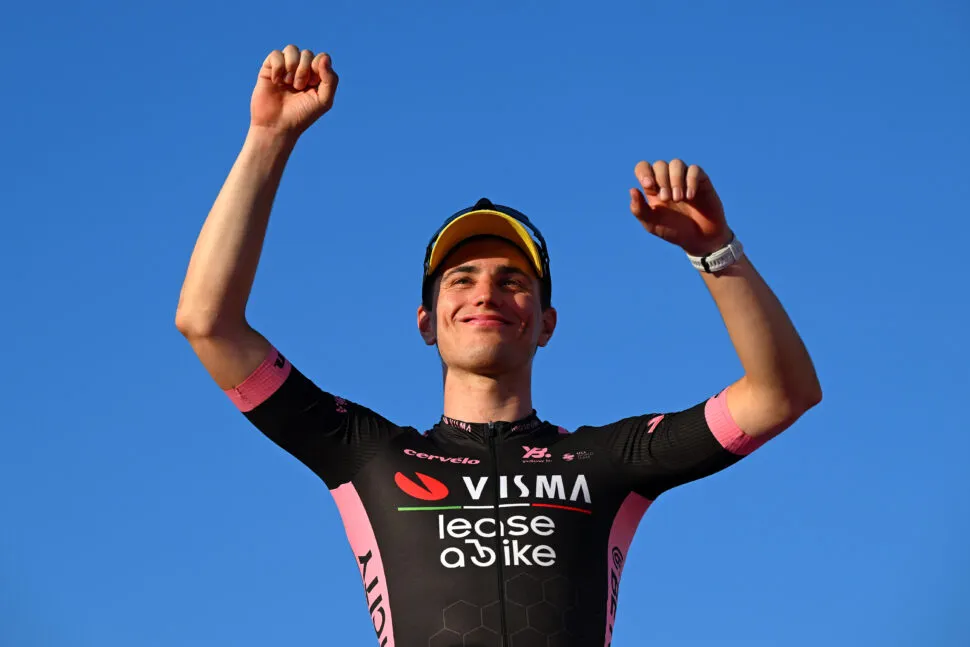 Tim de Waele/Getty Images
Tim de Waele/Getty Images
It’s expected that Copenhagen will host the 2028 contest. On the other hand, several other Danish cities will be involved in the Championships, with Aarhus considered a co-host. It’s mathematically impossible that the two will host the same races, but I’ll have my fingers crossed for an Aarhus finale as it’s marginally less flat than Copenhagen.
Regardless of whether it’ll finish in Aarhus or Copenhagen, let’s assume the race will be pan flat. The new Copenhagen Sprint may give us an insight into what the organisers have in mind. In that case, a winding city-centre course tailored to a bunch sprint.
The last time we came to Copenhagen, Britain’s Mark Cavendish took the men’s title. I’d love to forecast the same fate for Matt Brennan. He’ll be 24 once the Danish Worlds arrive, so he could be starting to hit his prime years. He’ll also be supported by a strong British squad, which will be starting to reap the benefits of its golden youth generation.
However, I have to return to the likes of Philipsen, Kooij and Milan. While De Lie and Philipsen bicker for leadership, the Dutch come out victorious in the Danish capital, with Kooij bringing home another rainbow jersey to Benelux.
As for the women, refer to my previous Lorena Wiebes musings. She won the recent Copenhagen Sprint as well, don’t forget.
Cyclist’s prediction: Lorena Wiebes and Olav Kooij
Brussels 2030
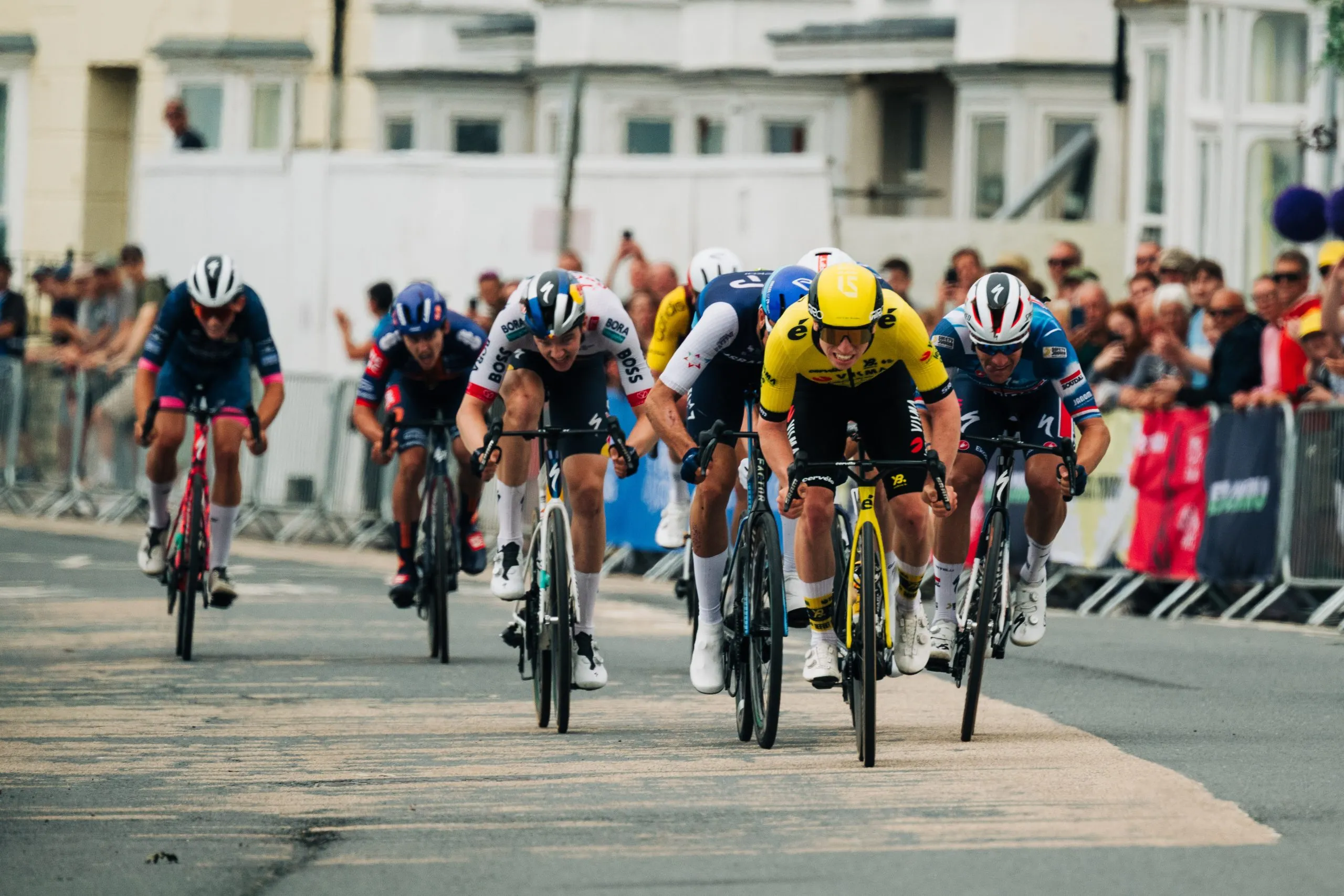 James York
James York
The World Championships will return to Belgium in 2030. While the Championships usually require a city circuit to conclude things, Belgium has the best possible sandbox to create a stellar Worlds suited towards the Classics men. The route won’t be known for another two or so years, but the capital is near the iconic Kapelmuur and the brutal cobbled climbs of the Brabantse Pijl parcours. If the organisers tick some of those bergs off, the pack can return to Brussels for the final dash to the line.
In this case, I’m going to consider this a cobbled World Championships. This will provide a rare opportunity for the Tour of Flanders specialists to score a gold medal. However, with the cobbles a fair distance away from Brussels, sprinting legs will be needed to pull on the rainbow jersey.
Now, this is where I see Matt Brennan thriving. He’s fairly unproven on the cobbles at this point in time, but he’s got the hilly capabilities of making a crucial selection through the hellingen. António Morgado, Thibau Nys and Albert Philipsen could all show their hands too, with the former the youngest top ten finisher at the Tour of Flanders in a century. Pitted in a sprint though, Brennan is the rider who comes to mind.
I hear you crying out Mathieu van der Poel, Mads Pedersen and Pogačar’s names, but Van der Poel will be 35 once the race comes to Brussels, and the Danish former champ will be 34. Pogačar might be bored of winning come 2030, having worn the rainbow jersey for four years in our alternate timeline.
As for the women, I wouldn’t be surprised if Wiebes won a third rainbow jersey on a Classics-adjacent course. It was on a similar route last year that she won the UEC European Championships in Belgium. Ireland’s Lara Gillespie could also be in the frame, but I think there’s a chance for the British to double up here if Cat Ferguson continues her stratospheric rise through the ranks. At age 24, she’d be close to hitting her physical prime, but so will Puck Pieterse, who will be 28 at the time of the Belgian Worlds. Don’t count out a 32-year-old Elisa Balsamo either. At the end of the race, a sprint could be what separates them.
Cyclist’s prediction: Cat Ferguson and Matt Brennan
Trentino 2031
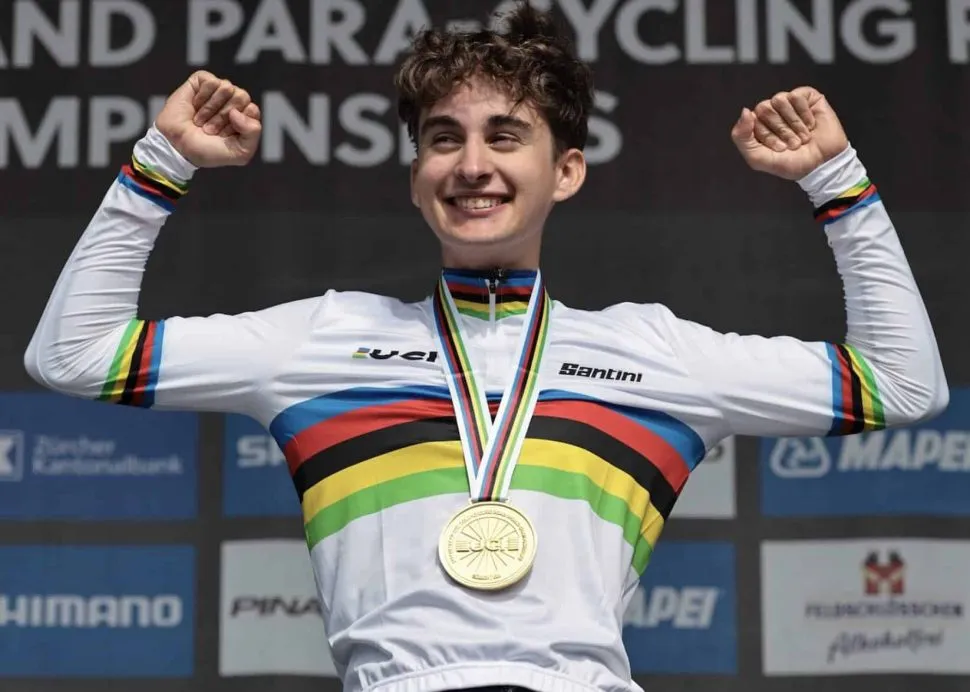 UCI
UCI
The Italian region of Trentino was just announced as the host for the 2031 UCI World Championships, which will serve up the sport’s third edition of the so-called Super Worlds.
The decision came last week, so we don’t have any idea of what the parcours will be. That said, the regional capital of Trento hosted the 2021 UEC European Championships. On that occasion, the route was punchy, covering the Povo climb (3.6km at 4.7%) on each lap. If that’s adopted here, the race could suit the climbers and puncheurs.
With that cleared up, let’s start by predicting the women’s race. For this, it’s hard to predict just who will still be in the frame in six years time. The current wave of world-leading talent will all be retired or close to retirement age. By 2031 however, Sarah Gigante, Niamh Fisher-Black, Cédrine Kerbaol and Juliette Labous will still be kicking about. Some more names that’ll still be under 32 years of age once the Trentino Worlds come around include Sarah Van Dam, Liane Lippert, Pieterse, Karlijn Swinkels and Dominika Włodarczyk.
I could really throw a dart at a page here, but part of me wants to believe in the current crop of youngsters rising through. For that, I’m torn between Viktória Chladoňová and Marion Bunel. Both teammates at Visma-Lease a Bike, Bunel has shown more promise on the elite stage over the past two years. The Frenchwoman has bags of talent, and this could be the place to demonstrate that.
As for the men, there’s a similar predicament. We’re inundated with talented riders who’ll be in their mid-20s come the 2031 World championships. It’s another matter guessing which ones will stand the test of time and be able to compete for a rainbow jersey. Juan Ayuso will be 29 and Oscar Onley 28, but I see this as a showdown between France’s Paul Seixas and Mexico’s Isaac del Toro. Both are incredibly capable one-day riders, proven recently at the 2025 Championships. Pitted against each other, I have to side with Del Toro – mainly to avoid another clean sweep after the Netherlands and Great Britain dominated the previous two years.
You could argue that I’ve been blinded by the newcomers. Pogačar will only be 33 and Remco Evenepoel 31 at these Super Worlds, so both could be in contention for another rainbow jersey in Italy. Chances are, Evenepoel will still be World Champion against the clock come 2031.
Cyclist’s prediction: Marion Bunel and Isaac del Toro

